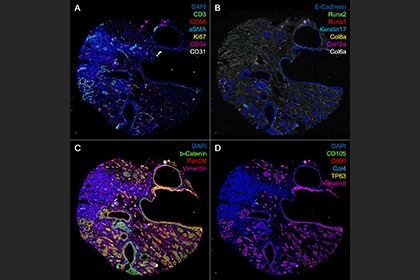UVM Cancer Center researchers contributed to the establishment of a breast pre-cancer atlas, which establishes the molecular and cellular properties of early-stage breast cancer and is the result of a six-year, National Cancer Institute-funded, collaborative initiative.

Gene expression in human breast cancer specimen analyzed by multi-spectral imaging.
As published in npj Breast Cancer, a Nature Portfolio publication, the pre-cancer atlas – a six-year, NCI-funded, collaborative initiative - establishes the molecular and cellular properties of early-stage breast cancer. By combining histological, molecular, and immunological profiling to provide risk markers for tumor progression, the groundbreaking research offers guidance for treatment or evidence-informed observation.
The paper, “The breast pre-cancer atlas illustrates the molecular and micro-environment diversity of ductal carcinoma in situ,” is co-authored by a team of six UVM Cancer Center investigators, Janet Stein, Ph.D., Donald Weaver, M.D., Gary Stein, Ph.D., Brian Sprague, Ph.D., Jonathan Gordon, Ph.D., and Mark Evans, Ph.D., who partnered with scientists and clinicians at the University of California San Francisco, the University of California Davis, and the University of California San Diego.
Leveraging the power of recent methodological advances, the team characterized the mutational, transcriptional, histological, and micro-environment landscape of thirty-nine patient tumors to develop a multimodal breast pre-cancer atlas.
The pre-cancer atlas combines parallel histological, molecular, and immunological profiling to provide risk markers for tumor progression and guidance for evidence-informed observation.
The breast pre-cancer atlas represents the expertise and experience of UVM Cancer Center scientists and physician investigators and the effective partnerships of cancer center members with colleagues who bring complimentary research and clinical capabilities.
“The fabric of our Cancer Center is collaboration and the initiative reported in The breast pre-cancer atlas illustrates the molecular and micro-environment diversity of ductal carcinoma in situ illustrates a significant contribution that will be broadly relevant,” said Dr. Gary Stein, a co-investigator.